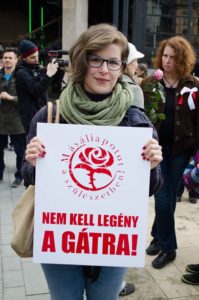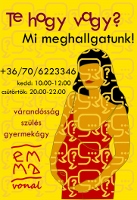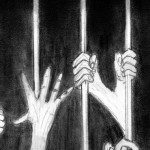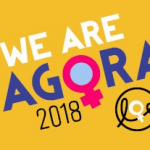A lot of myths concern motherhood and birth in our societies. You would think – especially if you haven’t given birth in a hospital before – that birth is a natural, loving process. But the reality is far from it: hospitals are crowded, doctors don’t have time to, or cannot, respect the desires of the women giving birth. A discussion with Pálma Fazakas, a Hungarian activist for obstetric rights, on what possibilities activists see to achieve a health care system that respects the rights of women giving birth.
Throughout Europe, movements have formed to demand more dignity in obstetrics. One of these organisations is the Hungarian EMMA association, formerly known as Születésház (Birth House). In Hungary, it is also very difficult to get permission for home births, and women who come to hospitals after having had difficulties with their home birth are often not welcome.
Pálma Fazakas is the coordinator of the EMMA association. The organisation provides information concerning pregnancy and giving birth. They participate in academic research, serve as an interest group and offer workshops. Their help line is open for women and their families who encounter violence and misconduct during their time in hospital. Fazekas tells me that they cooperate with organisations and groups that work on similar issues nationally and internationally, and exchange best practices. Together, they aim to develop an obstetric system that guarantees equal access for everyone.
When and how did your association form? Who do you want to reach with your association?
Our association has been working under the name Születésház since 2010, as an active organisation providing information and representation for women. We see it as our duty to defend the rights around birthing for women and their families. In 2016 we changed our name to EMMA non-profit association. EMMA stands for us, you and me, everyone in Hungary who is in any way connected to giving birth, being born, and obstetrics more generally. We guarantee support and information. We are a place where women can freely speak about their experiences around having children and where these are unconditionally valid.
Only few people have heard of “obstetric” or “birthing” rights. What does this mean and why are they endangered in your view? Can a woman in Hungary today freely decide if, when, and how she wants to give birth?
Women’s reproductive rights don’t only encompass if or when a woman wants to give birth, but also, in what conditions she gives birth to a child: where she will do it, and who will be with her.
The universal rights of women giving birth have deep roots in human rights and include the human rights to health, self-determination, and a private life. Every woman who is giving birth has the right to physical, emotional, and social health during the birthing process. She has the right to free choice around the conditions of the birth, and the interventions on her body (after getting satisfactory information on the process), to the protection of her personal data, and, finally, to always be treated with dignity and respect, without discrimination[1].
Unfortunately, the woman giving birth often faces many obstacles to a free and informed decisionmaking. Because there is no information or statistics on how hospitals treat women giving birth in Hungary, women have to trust word-of-mouth to inform themselves about the birthing process in a given hospital. The discrimination mostly happens during the process of giving birth: through negative suggestions (“it’s not going to work”, “the pain is decreasing”, “your hips are too tight”), by scaring the women (“the baby is going to die”, if she does not agree to the proceedings), humiliation and disrespect (“stop bawling”, “you didn’t cry when you made the baby”, “it doesn’t even hurt so much”, “behave already”), or by not respecting the woman’s privacy (leaving the door open during the birthing process, going in and out without permission).
In this situation, it is very important for me to note that the legal system can’t put the responsibility on the woman, but on her environment: we, the environment have to guarantee that women can exert their rights. It shouldn’t be their responsibility to fight for it.
On March 20th of this year several hundred people joined in a demonstration for the movement “Different conditions in obstetrics” (in Hungarian there is one word for “childbearing” which translates as “different conditions”: másállapotot a szülészetben). Who participated in the event? How was it represented in the media? Has your reputation also spread to other cities than Budapest?
Women and their families participated in the event. According to police statistics there were about 700 adults plus many children. But there were also many professionals present.
In this video (in Hungarian), Pálma Fazakas says:
“When my children get to the age where they want to give birth, I want that their well-being does not depend on the mood of the doctor, or on money, or on the grace of the hospital director – but that they can give birth to children just as they want.”
Three provincial cities participated in the event: Székesfehérvár, Szeged and Debrecen. The repercussions in the media were big. The Metropol, the TV channel ATV, the weekly news show Tények, the online magazine Index, and the Hungarian Medical Association reported on the event.
Here are more pictures of the event.
How do you see the chances of your organisation changing the political and societal atmosphere in Hungary? Will there be more demonstrations?
“Different conditions in obstetrics” has grown to become a movement by now; we have started lobbying. In April, the organisers met up with the Deputy Secretary of the Family Ministry. We are only at the beginning of a long and difficult road. Demonstrations on the street are one part of this process, but it is just as important to openly communicate with professionals [in the health care sector], to conduct lobbying with decision makers, advocate for change in the education of future obstetric professionals and empower women.
Even before the event, many prominent professionals supported the movement with an open letter, like Dr. Károly Pap, the General Secretary of the Hungarian Obstetric Gynaecologists Association, and Dr. Róbert Póka, university professor and director of a clinic. This makes it easier to be noticed by decision makers.
How do you cooperate with hospitals? There, the problem is that often doctors and nurses don’t have enough time to offer dignified treatment to pregnant women. How can this situation be changed?
The priorities and perspectives of the women, the professionals and the political administration organising health care do not coincide. What we want, is for professionals and administrators to listen to and hear, what women deem as important. It is often a matter of time and perspective to include the desires of the woman giving birth. These two are the things that are most difficult to get, when you have already used up all the resources. But we need both time and inclusion of different perspectives to ensure dignity in the birthing process.
It is important to understand that we all stand together, those of us who work in the health care sector, so that healthy mothers, babies, and families can step into life after birth. But health goes further than having a mother and newborn that are alive. With every birth, a new life, mother, and a new family are born or the existing family grows, in the physical, emotional and social sense as well. Our association believes that good care begins with the woman, the mother. Everything that helps the mother, also serves the newborn and the family, and finally, society. The mother and child are an inseparable entity, their interests should never be put against each other, neither during birth, nor after. And for the mother it is best if they include her in the right way and [that she] shapes the process, if she can be an active part of it.
This perspective is completely different from the way in which medical professionals have been and currently are trained in Hungary. At the same time we notice that many professionals feel and hear that change needs to happen. And they also see, that this change is good for the profession too, that it can bring more satisfaction.
We experience some institutions where dialogue and exchanging experiences is possible. Talking openly, directly, constructively – only this can move us forward.
Is there some sort of European cooperation? I am thinking of last year’s effective campaign for access to abortion in Spain, and other movements, that are fighting for women’s reproductive rights across Europe. Does something similar exist in the field of obstetric rights?
There is a lot cooperation around obstetric rights internationally, especially since 2010. We are part of the international network, Human Rights in Childbirth, which was created partly because of legal trials against midwifes who support childbirth outside of the institution (including Dr. Ágnes Gereb in Hungary), and partly because of the case of the European Court of Human Rights vs. Ternovszky ruling in 2010[2].
Since 2016 our association is a member of the International Cesarean Awareness Network. The network aims to uncover cases of obstetric violence and support women in their claims of violence that they have experienced.[3]
Since 2014, we have participated in the childbirth-related projects of the European Cooperation in Science and Technology. Part of these projects was collecting and analysing Hungarian data for the Babies Born Better survey . The study was conducted in 23 languages and 31 European countries, and aimed to research which parts of the childbirth process and care were satisfying mothers, and how. In the same project, we participated in other studies regarding obstetric violence, and the attendance to marginalised women living in underprivileged situations during childbirth.
The movement on March 20th, also called Roses Revolution, was organised with the support of an international grassroots movement of the same name. This movement aims to raise awareness of the fact that obstetric violence is a form of violence against women, and primarily a structural form of violence. It has to be treated accordingly, so that obstetric violence becomes part of the discussion around violence against women.
[1] Without discrimination means that the woman giving birth gets full information on the medical process, her health and well-being, and can make informed decisions on the birthing at any point in the process. This concept should be valid for any woman, whether able-bodied or disabled, young or old, rich or poor.
[2] In this case, the ruling introduced the right of the parent to choose the circumstances of becoming a parent, e.g. at home or in the hospital.
[3]A dedicated website gives an overview of cesarean rates in US hospitals. An article (in Hungarian) reflects on the growing rates of cesareans in the country, which have increased from 10% in 1990 to 39% in 2015.
*Explanation of the placard in the second picture: The text is a play on words with the traditional Hungarian saying “legény kell a gáton”, which means “a lad is needed on the dam” = we need someone who is not frightened by difficulties. But referring to obstetric violence, the woman holding the placard wants “no man on the dam” of the woman giving birth, ergo no violence or discrimination to the women giving birth by the (mostly male) doctors.[:or]A szülés és az anyaság körül sok mítosz forog a társadalmunkban. Olykor azt hinné az ember – főleg ha még nem szült kórházban – hogy természetes dolog a szülés, egy szeretetteljes folyamattal nézünk szembe. De ez messze nincs így, a kórházak zsúfoltak, az orvosok nem érnek rá, vagy nem veszik figyelembe a szülő nők kívánságaikat. Fazakas Pálmával, aki egyesületével a szülési jogokért küzd, készült egy interjú, melyben beszámol arról, hogy milyen lehetöségeket lát arra, hogy egy egészségügyi rendszer jöjjön létre, mely a szülö nök jogait tiszteli.
Ezért egész Európában sok mozgalom alakult, mely több méltóságok követel a szülészetbe. Egyikük az EMMA Egyesület, volt néven Születésház. Magyarországon például nagyon nehéz az otthon szüléshez engedélyt kapni, és sok helyen rosszul fogadják, ha a nő egy bonyolult otthonszülés után jön a kórházba.
Fazakas Pálma az egyesület koordinátora. A szervezet a várandóssághoz, szüléshez, gyermekágyhoz kapcsolódóan információkat szolgáltat, érdekérvényesítő tevékenységeket végez, tudományos kutatásokban vesz részt, segélyvonalat működtet (EMMA vonal), és műhelymunkák (EMMA Műhely) keretében támogatást nyújt a nőknek, illetve családjaiknak. Fazekas elmeséli hogy hazai és nemzetközi szinten is együttműködnek olyan csoportokkal és szervezetekkel, akik a személyre szabott, nőközpontú, a nemzetközi ajánlásokat és jógyakorlatokat követő, egyenlő hozzáférést biztosító szülészeti ellátórendszer kialakulásán dolgozik.
Mikor és miért alakult a Születésház/EMMA Egyesület? Kit szeretnétek elérni?
A Születésház Közhasznú Egyesület 2010 óta aktívan működő női információs és érdekképviseleti szervezet, mely küldetésének tekinti, hogy a nőket és családjaikat a szülés körüli jogaik érvényesítésében támogassa. 2016 február óta EMMA Közhasznú Egyesület néven folytatja tevékenységét. EMMA mi vagyunk, te is, én is. EMMA mindenki, aki itt és most Magyarországon bármilyen formában kapcsolatba kerül a szüléssel, születéssel, a szülészeti ellátással. Elsődleges feladatunknak azt tekintjük, hogy a nők szempontjait közvetítsük és érvényesítsük. Támogatást és információt biztosítunk, egy olyan hely vagyunk, ahol a nők gyermekvállalással kapcsolatos tapasztalatai szabadon kimondhatók és feltétel nélkül érvényesek.
Sokan még nem hallottak arról hogy vannak „szülési jogok“. Ez mit jelent és miért vannak ezek veszélyben? Ma Magyarországon egy nő szabadon dönthet-e arról hogy mikor, hogyan és egyáltalán szeretne-e szülni?
A nők reprodukciós jogaihoz nemcsak az tartozik hozzá, hogy eldöntse mikor szeretne gyermeket vállalni, hanem az is, hogy amennyiben gyermeket hoz a világra, azt milyen körülmények között teszi: hol és kiknek a jelenlétében.
A szülő nők egyetemes jogai mélyen az emberi jogokban gyökereznek, és magukban foglalják az egészséghez, önrendelkezéshez, magánélethez való alapvető emberi jogokat.
Minden szülő nőnek jogában áll, hogy a szülészeti ellátás során is védjük a testi-lelki és szociális egészségét. Hogy megfelelő tájékoztatást követően szabadon dönthessen a szülése körülményeiről, a testét érintő beavatkozásokról. Hogy a személyes adatait védelem övezze. Hogy minden körülmények között tisztelettel és méltó módon bánjanak vele, mindenféle megkülönböztetés nélkül.
Sajnos a szülö nö informált döntése akadályokba ütközik, a legtöbb jogsértésnek ez áll a hátterében. Nincsenek információk a kórházak statisztikáiról, a kórházi eljárásokról, a nők szóbeszédre kell támaszkodjanak, nincsen minőségbiztosítási rendszer. Az ellátás nem a tudományos ajánlásokon, hanem a szokásjogon alapul.
A nem megfelelő bánásmód különösen a szülés alatt történik: negatív szuggesztió („nem fog menni”, „gyengülnek a fájások”, „szűk csípő”), félelemkeltés („meg fog halni a baba”, ha nem egyezik bele a beavatkozásokba), megalázó bánásmód (szeméremérzet figyelmen kívül hagyása – nyitott ajtónál szülni, ki be mászkálnak engedély nélkül, „ne üvöltsön már annyira”, „akkor sem üvöltött amikor megcsinálta”, „nem fáj az annyira”, „viselkedjen már, türtőztesse magát”).
Ebben a helyzetben fontos megjegyeznünk, hogy a jog nem a nőre, hanem a környezetre ró felelősséget: a környezetnek, nekünk kell biztosítanunk, hogy a nők gyakorolhassák a jogaikat. Nem az ő feladatuk lenne küzdeni érte.
Március 20.-án több százan követeltek “Másállapotot a szülészetben“. Kik vettek részt az eseményen? Milyen volt a rezonancia a médiában? Vidéki városokba is kiterjedt az EMMA híre?
Az eseményen nők és családjaik vettek részt, a rendőrségi adatok alapján kb. 700 felnőtt plusz a rengeteg gyerek. De jelen voltak szakemberek is.
“Ha a gyermekeim egyszer olyan korba kerülnek hogy szülni szeretnének, azt szeretném, hogy akkor ne az orvos jókedvén vagy a pénzen múljon, vagy éppen a korházigazgatónak az engedégenysékén – hanem hogy úgy tudják szülni a gyereket ahogy szeretnék,”
mondja Fazakas Pálma az eseményröl készült videóban.
Három vidéki város is részt vett az eseményen: Székesfehérvár, Szeged és Debrecen és nagy volt a visszajelzés a médiában. Többek közt a Metropol, az ATV, a Tények, az Index, és a Magyar Orvosi Kamara is beszámolt a rózsás felvonulással.
Képek az eseményről.
Hogyan látod annak az esélyeit, hogy változást érjetek el a mai Magyar politikai és társadalmi hangulatban? Lesznek több tüntetések?
A “Másállapotot a szülészetben” mára már mozgalommá nőtte ki magát, elkezdődött egy lobbimunka. A szervezők a múlt héten találkoztak a Családügyi Minisztérium helyettes államtitkárával. Hosszú és nehéz út előtt állunk. Az utcai megmozdulások az egyik része ennek a folyamatnak, ugyanannyira fontos a szakemberekkel való nyílt kommunkiáció, a döntéshozókkal a lobbimunka, az leendő szülészek oktatásába bevezetett változtatások és a nők megerősítése.
Már az esemény előtt több prominens szakember is nyílt levélben támogatta a mozgalmat, mint Dr. Pap Károly, a Magyar Nőorvos Társaság főtitkára, és Dr. Póka Róbert egyetemi tanár és klinikaigazgató, ezzel bővítve az esélyeket hogy a döntéshozók figyelmébe kerüljön az esemény.
Milyen az összemüködés a kórházakkal? Hiszen ott épp az a baj, hogy gyakran nincs elég idejük az orvosoknak és növéreknek, méltó ellátást biztosítani a kismamáknak. Hogyan lehet ezen a helyzeten változtatni?
A nők, a szakemberek és az egészségügyi ellátást szervező és működtető mindenkori kormányzat szempontjai és prioritásai nem esnek egybe. Amit mi szeretnénk, ha a szakmai és politikai döntéshozók meghallgatnák és meghallanák, mi és miért fontos a nőknek. Amit a nők szeretnének, legtöbb esetben valóban idő és szemlélet kérdése. Az a kettő, amiből a legnehezebb pluszt teremteni, amikor már minden tartalékot feléltünk. De mindkettö szükséges ahhoz, hogy biztosítva legyen a nök méltósága a szülésben.
Fontos megérteni, hogy mind egy oldalon állunk, akik azért dolgozunk, hogy egészséges anyák és babák, családok induljanak neki az életnek a születést követően. Az egészség azonban túlmutat azon, hogy mind az anya, mind az újszülött életben vannak. Minden születéssel egy új élet, anya, és egy új család születik, testi-lelki és szociális értelemben egyaránt. Az Egyesület álláspontja szerint a jó és eredményes ellátás a nővel, az anyával kezdődik. Minden, ami az anyát szolgálja, az egyben az újszülöttet és a családot, végső soron a társadalmat szolgálja. Az anya és a gyermek elválaszthatatlan egységet képeznek, érdekeik sem a szülés alatt, sem azt követően nem szembeállíthatók. Az anya számára pedig a legjobb, ha a neki megfelelő módon és mértékben bevonják az ellátásba, aktív részese lehet annak.
Ez a szemlélet gyökereiben különbözik attól, amire a most gyakorló szakembereket képezték és képzik. Ugyanakkor azt tapasztaljuk, hogy sok szakember érzi és hallja, hogy változásra van szükség. És azt is látja, hogy ez a változás a szakemberek számára is jót, megelégedettséget hozhat.
Nekünk az a tapasztalatunk, hogy vannak olyan intézmények, ahol nyitottak a párbeszédre, a tapasztalatcserére. Beszélni, beszélgetni, egyenesen, nyíltan, konstruktívan. Csak ez vihet előre.
Van-e európai összemüködés? A tavalyi spanyol eredményes küzdelmet képzelem itt el, az abortusz-szigorítás ellen, és más mozgalmakat, melyek európaszerte a nök reprodukciós jogaikért küzdenek. Létezik-e ilyesmi a szülési jogoknál is?
A szülési jogok körül különösen 2010 óta számos nemzetközi együttműködés indult. Tagjai vagyunk a Human Rights in Childbirth nevű nemzetközi hálószervezetnek, amelyet részben az intézményen kívüli szülést támogató független szülésznők elleni jogi eljárások (köztük Dr. Geréb Ágnes), részben az Európai Emberi Jogi Bíróság Hungary vs. Ternovszky ügyben 2010-ben hozott döntése hívtak életre.
2016 óta Egyesületünk a Nemzetközi Szülészeti Erőszak Figyelő Hálózatának magyarországi tagja. A hálózat célja, hogy a szülészeti erőszak eseteit feltárja, és támogassa a nőket a rendszernek adott visszajelzésükben az őket ért sérelemről.[1]
2014 óta részt veszünk a European Cooperation in Science and Technology, kormányközi együttműködésen alapuló kutatói hálószervezet szülészeti témájú projekteiben is. Ennek a projektnek a keretében például a Babies Born Better (Jobb születést!) kutatás magyarországi adatait gyűjtöttük és elemeztük. A 23 nyelven, 31 európai országban zajló kutatás célja az volt, hogy megvizsgáljuk, a szülészeti ellátás mely elemei hogyan járulnak hozzá az anyai elégedettséghez. Ugyanennek a projektnek a keretében további kutatásokban veszünk részt a szülészeti erőszak, illetve a hátrányos helyzetben élő, marginalizált nők szülészeti ellátásának témaköreiben.
A március 20-i Rózsák forradalma megmozdulás is egy nemzetközi grassroot mozgalom, a Roses Revolution égisze alatt szerveződött. Ennek a mozgalomnak a célja, hogy felhívja a figyelmet arra, hogy a szülészeti erőszak (a szülészeti ellátásban gyakran tapasztalt, elsősorban strukturális erőszak) a nők elleni erőszak egy formája, és ennek megfelelően részét kellene, hogy képezze a nők elleni erőszakról szóló közbeszédnek.
[1] Ez a cikk bemutatja, hogy mennyire nött meg a császármetszések száma 1990 (szülések 10%-a) és 2015 (39%-a) közt.









[…] Obstetric Violence in Hungary […]
[…] 22nd August 2016 […]
[…] http://www.youngfeminist.eu/2016/08/22/stop-bawling-obstetric-violence-in-hungary/ […]